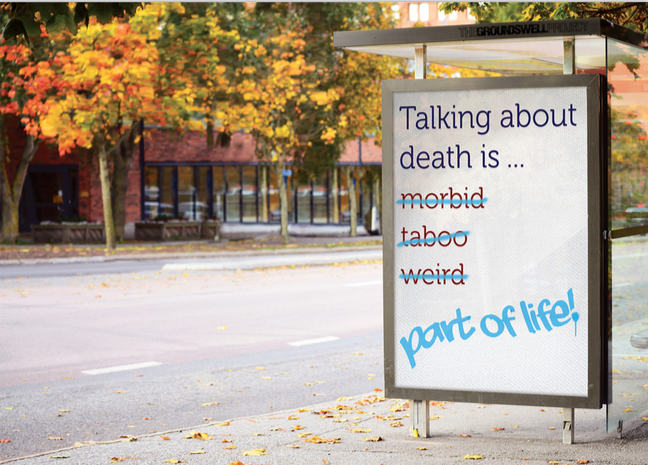This is a second interview with Carolyn Vaughan Illawarra-Shoalhaven Compassionate Communities local lead. Her first interview on Dying to Know Day, appears in this month’s (July 15) Good Grief! newsletter. To sign up to the Good Grief! newsletter, go to:https://good-grief.com.au/newsletter/

“Dying to Know Day is an annual event where we encourage people to start conversations about death,” says Carolyn Vaughan, Illawarra-Shoalhaven Compassionate Communities local lead.
“During August, people hold events, gatherings at home, take individual action, and much more, all to improve their knowledge around choice at end of life.
“Dying to Know Day has so many activities – there are public presentations, dinners, coffees, chats in the park – many opportunities for people just to share their thoughts and come together”.
“It can be formal or informal – anything you want it to be.”
“But it’s an opportunity for all of us to listen to other people, to hear about each other’s ideas and experiences. It challenges you to reflect on your own death especially, and to find new ways to be with that – holding yourself open to growing and learning – something we, hopefully can do until the day we die.”
“It can be a really light conversation, over coffee, or a beer with a mate. It might simply be asking that mate – ‘what music do you want played at your funeral? ACDC?”
The Groundswell Project’s Dying to Know Day is something everyone can join and participate in.
If you would like more information about Dying To Know Day, email Cherelle Martin, Campaign Manager at: cherelle@thegroundswellproject.com
Events can be conducted anytime during August. To share information about your event, go to: https://www.thegroundswellproject.com/tell-us-about-your-event
To find out about Dying to Know Day in your area, go to: https://www.thegroundswellproject.com/events-d2kday2021
Carolyn will be joining Margaret Rice (hyperlink to Good Grief in here) for a morning tea:
‘Conversations around Death and Dying’
- Conversations around death and dying
- Wednesday 11 August, 9.30 – 12 noon
- Dapto Ribbonwood Centre
- Heininger Hall,
- 93-109 Princes Highway Dapto
(we’ll post more information about this as the day gets closer.)
Start your own conversation
But here’s the thing. You don’t need an event to start the conversation. We’re not saying that’s easy but we can all start conversations about death.
In most hospitals in Australia today – even the large ones – not all the staff are comfortable about having conversations about end of life. And people working in different parts of our hospitals have different levels of skills and training in how to do this.
This is something Good Grief hopes will change.
To read one palliative care professional’s insights on this, go to:
The exciting development is that hospitals are starting to work with organisations such as Dying to Know Day to achieve this.
Conversations about death and dying in nursing homes
Good Grief! has been very busy this year, sharing with nursing homes our insights on improving conversations about death. In a way, this is a greater challenge than in a large hospital. Unsurprisingly, there have been lots of obstacles.
Covid-19 has made nursing homes afraid to welcome strangers, even though they normally like to invite people in. There have been lockdowns to abide by, like the current one in Sydney, and Covid-19 vaccinations to secure, then administer. And delays in this to cope with.
In addition some nursing homes, with the best intentions in the world, don’t have the time to release their staff for education – something we hope the Federal Government’s aged care initiatives announced in the last May 2021 budget will address.
Let’s be aware of what’s been promised, then hold the government to account over it. A good graphic to help understand the government’s promises can be found at:
Many elderly people don’t want to be reminded about death – it’s the constant hum at the back of their minds. And it’s getting louder. So conversations with this group have to be led in a way that respects our elders greater knowledge of life – and death.
But that’s not to say the conversation shouldn’t be started.
Here’s something that can help with that. Again, it’s a Groundswell Project’s resource – their Final Checklist.
If you work with people in a nursing home, or even just visit, you can print the checklist out and put it on the communal noticeboards within the complex.
And here are some of Good Grief’s own guides to preparing for a good death.
